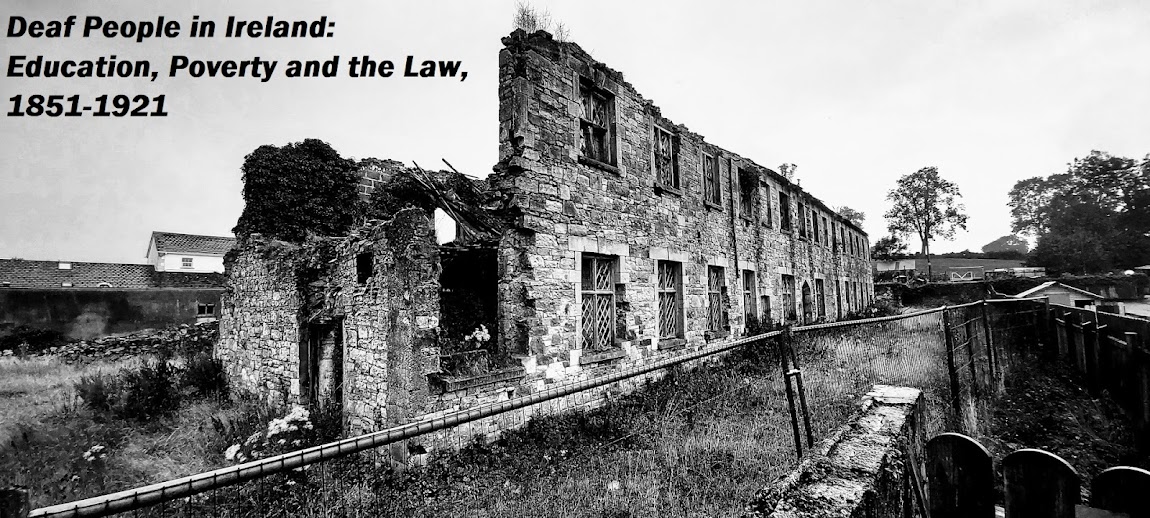An interesting case arose in 1910 when an uneducated Deaf labourer in Kerry left a will, which became the subject of a complex court battle.
Cornelius Corcoran died in Sept 1907 in a townland named Laghtacallow, near Keel, Co. Kerry. He was about 74 years old and had not been educated. In 1901 he was living with his brother, Thomas Corcoran, his wife and family. Cornelius' will case reveals that he possessed quite a lot of money - about £3,000 (worth about €268,000) today! How had this poor labourer amassed this fortune? It seems Cornelius "had been always a poor labourer depending on charity" - until a brother of his who had made his fortune in Western Australia died in about 1900, leaving Cornelius and another brother in America a total of £4,000 between them.
But Cornelius did not have free rein over this money. The executors of his brother's will came from Australia to Kerry to meet with Cornelius, buit found that he "was unable to take care of the money".
It's not clear whether this was simply because he was Deaf; it may have been his illiteracy that also contributed. Either way, £2,200 was deposited with a solicitor in Tralee named Joseph Mangan, and from then on, £10 per month was paid out to cover 'maintenance' for Cornelius - possible through his other brother, Thomas, whom he lived with.
But apparently, when Cornelius was near death, Thomas went to the same solicitor in Tralee, and had a will drawn up for Cornelius - leaving everything to himself. This will was challenged in court in 1909 and through 1910 by two people - firstly, John Corcoran, another hearing brother of Cornelius; and Jeremiah Corcoran, a son of the American brother. Jeremiah's challenge to the will was stark: Cornelius "no doubt, assented to the document" but "as a matter of law ... was quite incapable of making a will. A person who was born a deaf mute, and who in addition was illiterate, was supposed by the law to be an idiot, and, therefore, incapable of making a will." This was a successful strategy; the will was thrown out (or 'condemned') "on the ground of want of due execution and want of testamentary capacity".
This story, to me, raises a few questions. Firstly, it seems to us grossly unfair that such a rule could be enough to throw out a will by a Deaf person in the first place. It should be mentioned that this didn't mean that all wills by Deaf people were condemned; the point generally had to be challengd, and if it could be proved that the Deaf person was intelligent, could read and write etc., then it would be executed as normal. It may be that Cornelius was not in this position, being uneducated, and probably completely illiterate - such a challenge could be raised.
But then, earlier on, we see that Cornelius had a will. We don't know enough from the newspaper summaries to say if this will represented his real wishes. It's possible that Thomas took advantage of Cornelius' situation to deliberately manipulate the will and have this considerable sum made out to himself; it's also possible that Thomas, with whom Cornelius lived with at least at one stage, was kind to Cornelius, perhaps managed his money well for him, and Cornelius had a genuine wish to repay him through the will. We just don't know enough. We know that the Australian executors didn't deem Cornelius able to manage his fortune by himself, and again, we don't know enough about this either, and whether it was a fair assessment or whether it arose from prejudice against Deaf people (particularly, poor illiterate Deaf people).
What is interesting is that Cornelius himself seemed, earlier on in his life, to be well capable of bringing a legal case himself. In 1880 the Petty Sessions in Milltown saw a case where Cornelius (described as a 'mute') sued a neighbour, William Cahill. The information about the case is sparse. It seems to have been for wages owed, of £1 5 shillings. A witness - 'Cornelius Corcoran, jun.' - is listed, probably his nephew, who may have interpreted or acted as intermediary for Cornelius, and the magistrates gave a decree for most of the sum - 17 shillings.
Once again, evidence is sparse; more may be out there in some archive, but for the moment it's hard to reach definite conclusions; but it's tempting to conclude that Cornelius knew right from wrong, was able to fight his corner by bringing a neighbour to court, and was possibly treated poorly by those closest to him later in life - deemed unfit to control his own money; manipulated into assenting to a will; and dehumanised by the archaic presumption of incapacity in the courts of the time.
Sources:
- 1901 Census, Laghtacallow - Census of Ireland 1901 online
- 1907 civil death record, Cornelius Corcoran - IrishGenealogy.com
- Google Maps
- 1910 Will Calendar, Cornelius Corcoran - http://www.willcalendars.nationalarchives.ie/
- 1880 Milltown Petty Sessions Order Books, 8 Nov 1880 - FindMyPast.ie
- The Kerryman, 22 May 1909
- Irish Independent, 19 Jan 1910
- Freemans Journal, 19 Jan 1910
- Dublin Daily Express, 19 Jan 1910
- Larne Times, 20 Jan 1910
- Irish Times, 22 Jan 1910
- Killarney Echo, 29 Jan 1910

No comments:
Post a Comment